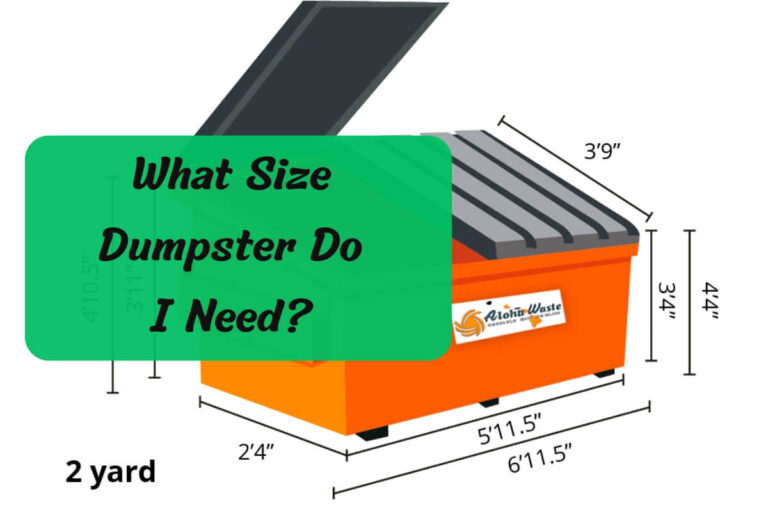Spring cleaning, home renovations, or landscaping projects often involve dealing with a significant amount of waste and debris. When faced with a pile of junk, many homeowners wonder, “How much is a 10-yard dumpster?” Renting a dumpster can be a convenient and cost-effective solution for managing large-scale cleanups or construction projects. However, understanding the associated costs and factors involved is crucial for proper budgeting and planning.
On average, a 10-yard dumpster rental costs between $224 to $531, but the exact price can vary significantly based on several factors. This comprehensive guide will cover everything you need to know about the cost of renting a 10-yard dumpster, including the factors that influence pricing, average costs by location and type of waste, tips for getting the best deal, and answers to common questions.
Factors Affecting the Cost of a 10-Yard Dumpster Rental
The cost of renting a 10-yard dumpster is not a one-size-fits-all figure. Several factors can impact the final price you pay, and understanding these variables can help you better prepare and budget for your project.
Location: Dumpster rental prices can vary significantly depending on your location. Different cities and states have different disposal fees and regulations, which directly influence the cost. For example, a 10-yard dumpster rental in New York City may be more expensive than in a smaller town due to higher landfill fees and stricter regulations.
Type of Debris/Waste: The type of materials you plan to dispose of can also affect the cost. Heavier items like concrete, bricks, and dirt may incur additional fees from the rental company or the disposal facility. Conversely, lighter materials like household junk or yard waste may be more affordable to dispose of.
Rental Period: Most dumpster rental companies offer a standard rental period, typically 7-10 days. If you need to keep the dumpster for a longer duration, you may be charged additional fees for each extra day or week.
Weight Limit: 10-yard dumpsters have a weight limit, typically ranging from 2 to 3 tons (4,000 to 6,000 pounds). If you exceed this limit, the rental company will charge overage fees, which can significantly increase your overall cost.
Additional Fees: Be aware of potential additional fees that may apply, such as delivery and pick-up charges, fuel surcharges, environmental fees, or permit fees (if required in your area).
By understanding these factors, you can better estimate the cost of your 10-yard dumpster rental and plan accordingly.
Average Cost of a 10-Yard Dumpster Rental
While the exact cost can vary, here is a general range of average prices for renting a 10-yard dumpster:
- For Household Junk or Yard Waste: $300 – $450
- For Construction Debris: $400 – $600
Most dumpster rental companies quote a flat rate that includes delivery, pick-up, and disposal fees up to a certain weight limit (typically 2-3 tons, as mentioned earlier). This flat rate can make it easier to budget for your project upfront.
Cost Variations by Location
Location plays a significant role in determining the cost of a 10-yard dumpster rental. Here are some examples of average costs in major U.S. cities:
- New York City: $690
- Los Angeles: $600
- Chicago: $500 – $535
- Houston: $425 – $650
- Phoenix: $550
Keep in mind that prices can vary not only between states but also within the same city or region, depending on the specific disposal fees and regulations in your area.
Cost Variations by Type of Waste
The type of waste or debris you plan to dispose of can also impact the cost of your 10-yard dumpster rental. Generally, heavier materials like concrete, dirt, and bricks incur higher disposal fees than lighter household junk or yard waste.
For example, a 10-yard dumpster rental for household junk or yard waste may cost around $350 in your area, while the same-sized dumpster for construction debris containing concrete or bricks could cost $500 or more.
How to Get the Best Deal on a 10-Yard Dumpster Rental
While dumpster rental costs can vary, there are several strategies you can employ to ensure you get the best deal possible:
- Shop Around and Compare Prices: Don’t settle for the first quote you receive. Contact multiple dumpster rental companies in your area and compare their prices, services, and rental terms. You may find significant differences in pricing and inclusions.
- Ask About Discounts or Promotions: Many companies offer discounts or promotions, especially for longer rental periods, off-peak seasons, or larger volumes. Inquire about any available discounts that could help reduce your overall cost.
- Consider Different Dumpster Sizes: If your project requirements allow for it, consider renting a smaller or larger dumpster size. Smaller dumpsters may be more affordable, but if you underestimate your needs, you may end up paying additional fees for multiple trips or rentals.
- Plan Your Project Carefully: Proper planning can help you avoid additional fees for exceeding the weight limit or rental period. Estimate the amount of waste you’ll generate and the duration of your project as accurately as possible.
By following these tips, you can maximize your chances of finding the most cost-effective solution for your 10-yard dumpster rental needs.
Common Questions About 10-Yard Dumpster Rentals
When it comes to renting a 10-yard dumpster, there are several common questions that homeowners and contractors often have. Here are some of the most frequently asked questions and their answers:
What is the typical rental period for a 10-yard dumpster?
Most dumpster rental companies offer a standard rental period of 7-10 days for a 10-yard dumpster. This timeframe is generally suitable for smaller projects like basement cleanouts, minor renovations, or yard work.
Suppose you need to keep the dumpster for a longer duration. In that case, you can typically extend the rental period by paying an additional fee, often calculated daily or weekly. Communicating your expected project timeline with the rental company is essential to avoid any unexpected charges.
What can and cannot be thrown away in a 10-yard dumpster?
While 10-yard dumpsters can accommodate a wide range of materials, certain items are typically prohibited due to environmental regulations or safety concerns. Here’s a general overview of what you can and cannot throw away in a 10-yard dumpster:
Accepted Items:
- Household junk (furniture, appliances, toys, etc.)
- Yard waste (leaves, branches, grass clippings)
- Construction debris (drywall, lumber, tiles, etc.)
- Concrete, bricks, and dirt (may incur additional fees)
Prohibited Items:
- Hazardous materials (asbestos, chemicals, paint, etc.)
- Electronics (televisions, computers, monitors)
- Tires
- Batteries
- Flammable liquids (gasoline, oil, etc.)
Follow local rules and rental company policies on allowed and banned items. Disposing of banned items can lead to extra fees or legal trouble.
How much weight can a 10-yard dumpster hold?
The weight limit for a 10-yard dumpster typically ranges from 2 to 3 tons (4,000 to 6,000 pounds). The exact weight limit will depend on the rental company and the type of materials you’re disposing of.
Here are some examples of how much common materials weigh to help you estimate the potential weight of your debris:
- Concrete & Asphalt: 3,500 – 4,200 lbs
- Drywall: 2,000 – 3,000 lbs
- Shingles(slate):9,000 – 10,000 lbs
- Bricks: 2,500 – 3,500 lbs
- Furniture: Varies, but a couch can weigh around 200-300 pounds
Exceeding the weight limit leads to extra fees, so estimate debris weight accurately and choose the right dumpster size and limit.
How do I prepare for a 10-yard dumpster delivery?
Proper preparation is key to ensuring a smooth dumpster delivery and pick-up process. Here are some tips to help you get ready:
- Choose a Suitable Location: Select a level, solid surface like a driveway or a designated area on your property. Ensure there’s enough clearance for the dumpster delivery truck to maneuver and enough space for the dumpster itself. Avoid placing the dumpster on grass or soft ground, as it may sink or become difficult to remove.
- Clear the Delivery Path: Remove any obstacles, such as parked cars, furniture, or landscaping features, that could obstruct the delivery truck’s access to the designated drop-off location.
- Check for Overhead Clearance: Make sure there are no low-hanging branches, power lines, or other overhead obstructions that could interfere with the delivery process.
- Obtain Necessary Permits (if required): Some municipalities may require a permit for placing a dumpster on a public street or right-of-way. Check with your local authorities to ensure you comply with any regulations.
By following these preparation steps, you can ensure a smooth and hassle-free dumpster delivery and pick-up process.
Can I load a 10-yard dumpster myself?
Absolutely! Most dumpster rental companies offer the option of self-loading, which means you can load the dumpster yourself instead of hiring their loading services. Self-loading can be a cost-effective solution, especially for smaller projects or if you have the necessary manpower and equipment.
However, it’s essential to follow proper safety precautions when self-loading a dumpster:
- Wear appropriate protective gear, such as gloves, sturdy shoes, and eye protection.
- Use proper lifting techniques to avoid injury, or enlist the help of others for heavy or bulky items.
- Distribute the weight evenly throughout the dumpster to prevent it from becoming unbalanced or overloaded on one side.
- Ensure that no items are hanging over the sides of the dumpster, as they may fall off during transport.
If you’re unsure about your ability to safely self-load the dumpster or if you’re dealing with particularly heavy or hazardous materials, it may be wise to consider the rental company’s loading services for an additional fee.
Conclusion
Renting a 10-yard dumpster can be a convenient and cost-effective solution for managing waste and debris from various projects. By understanding the factors that influence pricing, such as location, type of waste, rental period, and weight limits, you can better estimate and budget for your dumpster rental costs.
Remember to shop around, ask about discounts, and carefully plan your project to avoid additional fees. Additionally, familiarize yourself with the rental company’s policies regarding acceptable and prohibited items, as well as weight limits, to ensure a smooth and successful dumpster rental experience.
With the right preparation and knowledge, renting a 10-yard dumpster can make your next cleanup or renovation project a breeze, allowing you to focus on the task at hand without worrying about the hassle of waste disposal.

